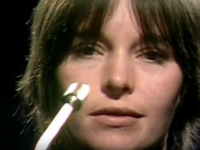Say the name “Alan Parsons Project,” and one typically thinks of Pink Floyd-like spacey tracks like “Time” or the ’80s hit “Eye in the Sky.” Typically the word “funky” does not spring to mind when considering the band, but their 1977 single “I Wouldn’t Want to Be Like You” signals a departure from their typical sound.
The driving, even danceable beat, paired with a scorching guitar solo, makes for a memorable track that sounds timeless.
“I Wouldn’t Want to Be Like You” derives from the Alan Parsons Project album I, Robot, an unlikely fusion of sci-fi and rock loosely based on Isaac Asimov’s short stories. The album’s themes were ahead of their time: its songs addressed the conflict between man and machine, and generally the fear of an overly mechanized society. Despite the unsettling topics, I, Robot reached No. 9 on the Billboard 200. The neo-disco “I Wouldn’t Want to Be Like You,” however, peaked at 36 on the U.S. charts.
Why it did not achieve more success remains a puzzle, as it represents the Alan Parsons Project at their best.
The song begins with dark synthesizer chords underscored by a pulsating bass, followed by a throbbing, almost menacing rhythm guitar riff. As the pounding of Stuart Tosh’s drums crashes through the fog, Lenny Zakatek’s lead vocals add some R&B flavor to the proceedings. “If I had a mind to, I wouldn’t want to think like you,” Zakatek sneers. As the music swells, the dramatic chorus kicks in with the devastating lines: “I don’t care what you do; I wouldn’t want to be like you.”
Could these words dramatize the battle between man and robot, humanity and artificiality? The lyrics leave vague impressions, allowing the listener to fill in the blanks.
Then comes the guitar solo, and what a solo it is: Ian Bairnson rips through the notes, adding emotion to the track, perhaps injecting life into this imagined overly-mechanized society. As the track reaches its conclusion, the song returns to its ominous beginning, with Zakatek softly singing over the chords. Then the track ends abruptly, leaving the outcome of the confrontation unclear.
Why did “I Wouldn’t Want to Be Like You” fail to reach the Top 20? Maybe it represented too much of a departure for Alan Parsons fans, its dark sci-fi themes may have overwhelmed some listeners, or the song’s strange video may have creeped out viewers. Whatever the reason, the track has a timeless quality that makes it hard to believe it dates from 1977, and it possesses a relentless groove that still moves 36 years later.
- How John Lennon Came Roaring Back on the Beatles’ White Album - November 22, 2023
- Five ‘With the Beatles’ Deep Cuts That Illustrate Their Lasting Debt to R&B - November 20, 2023
- Five Must-Hear Deep Cuts from the Beatles’ ‘Past Masters’ - March 7, 2023




